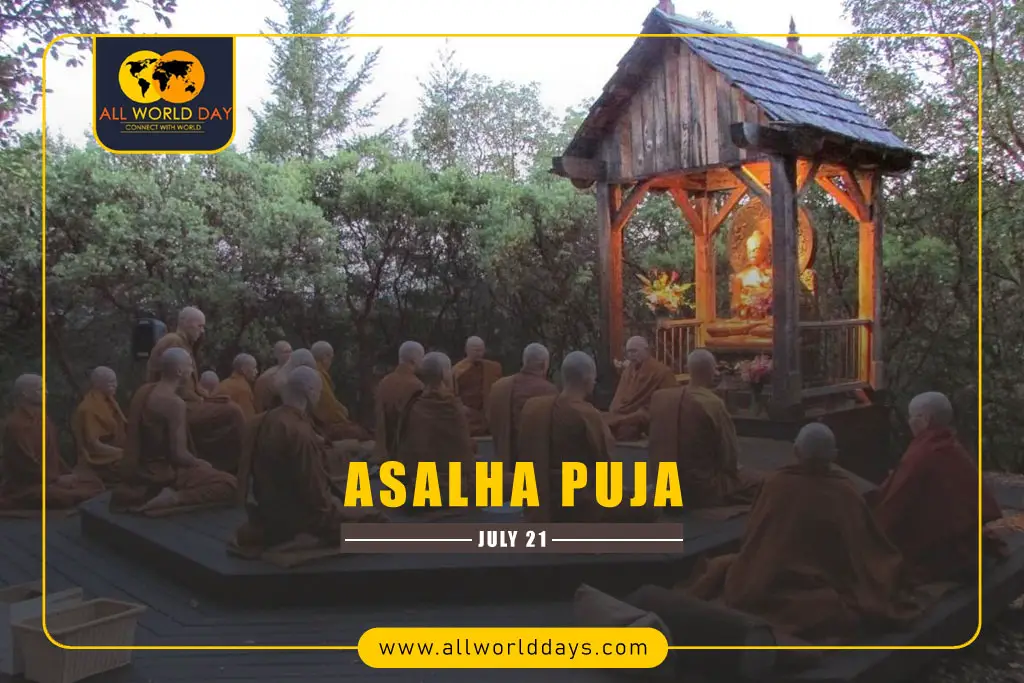Asalha Puja, also known as Dhamma Day, is a significant Buddhist festival celebrated on the full moon day of the eighth lunar month, usually in July. In 2024, Asalha Puja will be observed on July 22nd. This sacred day marks the Buddha’s first sermon, known as the “Dhammacakkappavattana Sutta” (the Turning of the Wheel of Dhamma), delivered at Deer Park in Sarnath.
The Significance of Asalha Puja
Asalha Puja commemorates a pivotal moment in Buddhist history when Siddhartha Gautama, after attaining enlightenment, shared the Four Noble Truths and the Noble Eightfold Path with his first five disciples. This event marks the establishment of the Sangha, the community of monks, and the foundation of Buddhist teaching and practice.
Traditions and Celebrations
Asalha Puja is a day of deep reflection, gratitude, and communal activities among Buddhists. The celebrations vary across different cultures, but common practices include:
Merit-Making Activities: Buddhists visit temples to make offerings such as food, flowers, and candles to the monks. These acts of generosity, known as merit-making, are believed to bring good karma.
Listening to Sermons: Devotees gather to listen to monks recite the Dhammacakkappavattana Sutta and other teachings of the Buddha. This reinforces their understanding and commitment to the Dhamma.
Meditation and Chanting: Many Buddhists participate in meditation sessions and chant sacred texts to purify their minds and deepen their spiritual practice.
Observing Precepts: Laypeople often take on additional moral precepts, such as refraining from lying, stealing, and engaging in harmful activities, as a way to cultivate mindfulness and ethical conduct.
Joining Processions: In some regions, colorful processions are held, with devotees carrying images of the Buddha and symbolic offerings through the streets, creating a festive and reverent atmosphere.
Asalha Puja Around the World
The celebration of Asalha Puja varies widely across different Buddhist cultures:
- Thailand: Known as “Asanha Bucha,” it is a national holiday where people engage in merit-making, temple visits, and candle-lit processions.
- The following day marks the beginning of the Buddhist Lent, “Vassa,” a three-month period of monastic retreat.
- Sri Lanka: Devotees participate in religious observances and reflect on the significance of the Buddha’s teachings. Temples hold special ceremonies, and many people observe extra precepts.
- Myanmar: Asalha Puja is marked with temple visits, alms-giving, and listening to Dhamma talks. The festival is a time for reinforcing one’s faith and commitment to Buddhist practices.
The Dhammacakkappavattana Sutta: The Core of the Teachings
The Dhammacakkappavattana Sutta outlines the core principles of Buddhism:
1. The Four Noble Truths:
- The truth of suffering (Dukkha)
- The truth of the origin of suffering (Samudaya)
- The truth of the cessation of suffering (Nirodha)
- The truth of the path leading to the cessation of suffering (Magga)
2. The Noble Eightfold Path: This path provides practical guidelines for ethical and mental development, aimed at freeing individuals from suffering and leading them toward enlightenment. It includes:
- Right Understanding
- Right Intention
- Right Speech
- Right Action
- Right Livelihood
- Right Effort
- Right Mindfulness
- Right Concentration
Celebrating Asalha Puja in 2024
Asalha Puja 2024 is an opportunity for Buddhists to deepen their understanding of the Buddha’s teachings and to renew their commitment to the path of Dhamma. Whether through meditation, chanting, or community service, the observance of this sacred day helps to foster a sense of unity, compassion, and inner peace.
As we approach Asalha Puja, let us reflect on the profound wisdom of the Buddha’s first sermon and strive to embody the principles of the Noble Eightfold Path in our daily lives. May this day inspire us all to cultivate mindfulness, ethical conduct, and compassion towards all beings.
Conclusion
Asalha Puja is a time for Buddhists worldwide to honor the Buddha’s teachings and to come together in a spirit of devotion and reflection. By understanding the significance of this sacred day and participating in its traditions, we can enrich our spiritual journey and contribute to a more compassionate and harmonious world.


